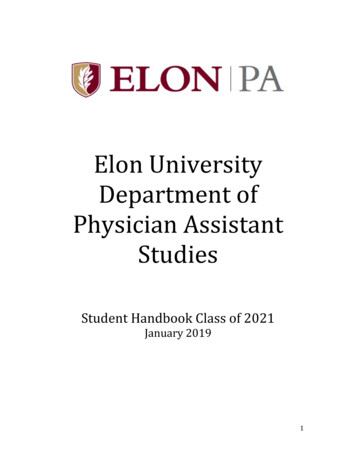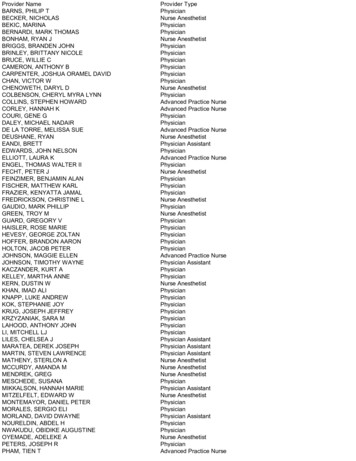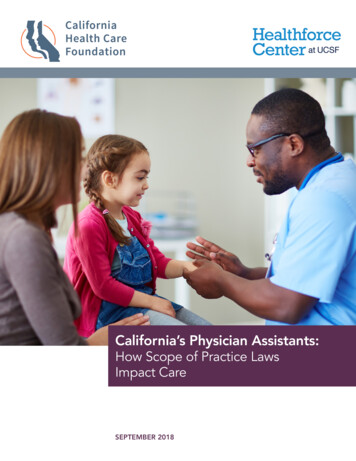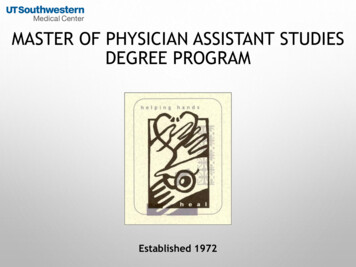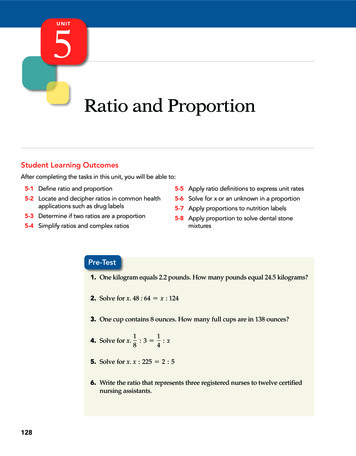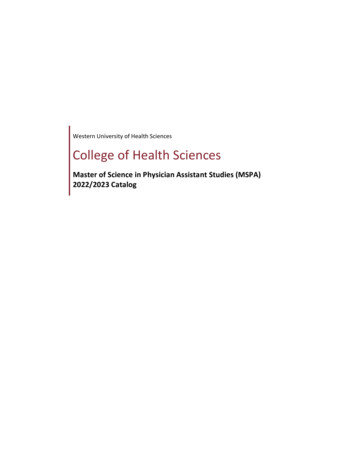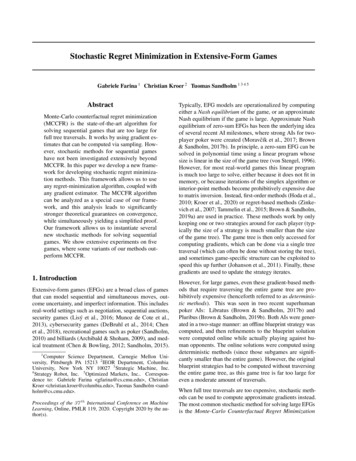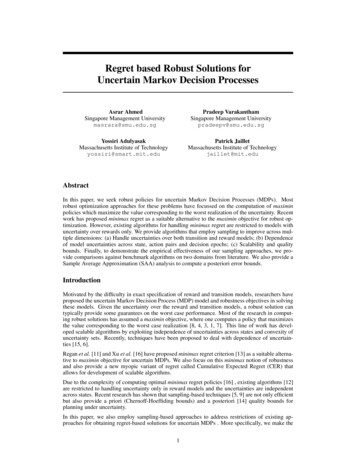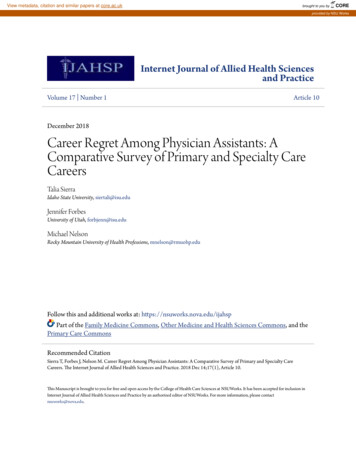
Transcription
View metadata, citation and similar papers at core.ac.ukbrought to you byCOREprovided by NSU WorksInternet Journal of Allied Health Sciencesand PracticeVolume 17 Number 1Article 10December 2018Career Regret Among Physician Assistants: AComparative Survey of Primary and Specialty CareCareersTalia SierraIdaho State University, siertali@isu.eduJennifer ForbesUniversity of Utah, forbjenn@isu.eduMichael NelsonRocky Mountain University of Health Professions, mnelson@rmuohp.eduFollow this and additional works at: https://nsuworks.nova.edu/ijahspPart of the Family Medicine Commons, Other Medicine and Health Sciences Commons, and thePrimary Care CommonsRecommended CitationSierra T, Forbes J, Nelson M. Career Regret Among Physician Assistants: A Comparative Survey of Primary and Specialty CareCareers. The Internet Journal of Allied Health Sciences and Practice. 2018 Dec 14;17(1), Article 10.This Manuscript is brought to you for free and open access by the College of Health Care Sciences at NSUWorks. It has been accepted for inclusion inInternet Journal of Allied Health Sciences and Practice by an authorized editor of NSUWorks. For more information, please contactnsuworks@nova.edu.
Career Regret Among Physician Assistants: A Comparative Survey of Primary and Specialty CareCareersPurpose: This study investigated if career regret varies among physician assistants (PAs) practicing in primaryand specialty care fields. This information may assist practicing and aspiring physician assistants when selectingor changing their career path.Methods: A survey was emailed to 5,000 primary and specialty care physician assistants. Items indicatingcareer regret were compared between primary and specialty care groups.Results: Eight hundred and thrity-four (16.7%) completed surveys were received back. Career regret is similarbetween primary and specialty care physician assistants, with low reports from both groups. No statisticalsignificance was found between primary care and specialty care groups with regards to career regret or studentloan debt. The primary care group noted a less sustainable work/ life balance and higher perceived burnout.Specialty care physician assistants reported higher annual gross income. Regret and disappointment correlatedhighly with burnout.Conclusions: Physician assistants and prospective physician assistants should carefully consider their careerpath as regret and disappointment correlated highly with burnout.Author Bio(s)Talia M. Sierra, MPAS, PA-C, Assistant Professor with the Department of Physician Assistant Studies at IdahoState University. She is also a licensed physician assistant in the state of Idaho.Jennifer Forbes, MHS, PA-C, Assistant Professor in the Division of Physician Assistant Studies at theUniversity of Utah School of Medicine. She is also a licensed physician assistant in the state of Utah.Michael L. Nelson, DHSc., MPAS, PA-C, Associate Program Director and Assistant Professor with theDepartment of Physician Assistant Studies at Rocky Mountain University of Health Professions in Provo, UT.AcknowledgementsThe Idaho State University Physician Assistant Studies Faculty Grant was awarded to the authors in the amountof 500 for the purposes of purchasing the e-mail rental agreement from AAPA and to purchase participationincentives of four 50 amazon gift cards to award to four random survey participants. Prior to data collection,the survey and research proposal were reviewed by our Institutional Review Board and determined to beexempt.This manuscript is available in Internet Journal of Allied Health Sciences and s1/10
Dedicated to allied health professional practice and educationVol. 17 No. 2 ISSN 1540-580XCareer Regret Among Physician Assistants: A Comparative Survey of Primaryand Specialty Care CareersTalia Sierra1Jennifer Forbes2Michael Nelson31.2.3.Idaho State UniversityUniversity of UtahRocky Mountain University of Health ProfessionsUnited StatesABSTRACTPurpose: The purpose of this study was to determine possible factors (eg type of practice) affecting career regret among physicianassistants (PAs). This information may assist practicing and aspiring physician assistants when selecting or changing their careerpath. Methods: A survey was emailed to 5,000 primary and specialty care physician assistants. Items indicating career regretwere compared between primary and specialty care groups. Results: Eight hundred and thirty-four (16.7%) completed surveyswere received. Career regret is similar between primary and specialty care physician assistants, with low reports from both groups.No statistical significance was found between primary care and specialty care groups with regard to career regret or student loandebt. The primary care group noted a less sustainable work/life balance and higher perceived burnout. Specialty care physicianassistants reported higher annual gross income. Regret and disappointment correlated highly with burnout. Conclusions:Physician assistants and prospective physician assistants should carefully consider their career path as regret and disappointmentcorrelated highly with burnout.Keywords: PA career regret, primary care, specialty care, PA burnout, physician assistantINTRODUCTIONBurnout and job satisfaction among physician assistants (PAs) has been extensively studied; however, research evaluating careerregret among PAs has not been conducted.1-5 Although many reports on career satisfaction have been done, none have comparedcareer regret between primary care and specialty care PAs.1-5 This information is important to consider when choosing or changinga career path, particularly with an evolving medical environment, increased patient demands, and industry shortages. 6Although research is lacking in regard to PA career regret, a study on career regret among physicians showed burnout and regretdecrease after residency.4 A review article by Hoff revealed high levels of satisfaction among physicians, but specifically noted aneed to evaluate satisfaction in a new way because of the changing work environment.7 Many factors may play a role in careerregret including salary and student loan debt. A study by Phillips attributed the shortage of family practice clinicians to student debtciting that pay is higher in specialties, making the selection of a family practice specialty a less practical career selection.8 The Internet Journal of Allied Health Sciences and Practice, 2019
CAREER REGRET AMONG PHYSICIAN ASSISTANTS3PAs have the unique ability to change specialties, and many may be considering a career change from a primary care field to aspecialty care field or vice versa. Additionally, PA students may ask themselves which field may best suit their lifestyle as they lookat beginning their careers. Advice in these areas can be difficult to offer because of limited availability of comparative studies andthe needs and desires of each individual.A PA may be satisfied with his or her choice of occupation, but if given the chance to choose again, may choose to pursue adifferent career path. It is possible that PA career regret may be present even though the PA reports career satisfaction. Thepurpose of this study was to determine if career regret differs among PAs practicing in primary and specialty care fields. Additionalfactors that may play a role in determining career regret were also evaluated in this study. This information may assist PAs whenselecting or changing their area of medicine and help those considering a career as a PA determine if the profession is the right fitfor them.METHODSA 24-item survey was developed for the present study that collected demographic data, area of specialty, and information aboutthe participants’ career as a PA. This included asking about the PAs perceived level of burnout, sustainability of work/ life balance,control of schedule, and satisfaction regarding PA career. Three items were used to measure regret and are shown in Table 1.Prior to data collection, the survey and research proposal were reviewed by our Institutional Review Board and determined to beexempt. Participation in the survey implied consent.Table 1. Regret itemsItem16. If you were advising a person who is considering a careeras a PA, how would you advise them?21. Do you feel your profession has been worth the sacrificesthat you made in order to become a PA?22. If you could choose again, would you choose to becomea PA or choose a different career path?Selection optionsPursue PA schoolGo to medical schoolChoose a different healthcare professionEnter a different field altogetherYesNoAttend PA school againChoose a different career pathAn email rental agreement was established with the American Academy of PAs (AAPA) for use of 5,000 email addresses of PAswho are currently registered members of the association. The list contained 2,500 primary care and 2,500 specialty care PA emailaddresses. The primary care group consisted of specialties listed by the Center for Medicare and Medicaid Services as primarycare.9 This included family practice and internal medicine. Geriatrics and pediatrics were requested by the authors, but emailaddresses in these categories were unable to be provided by AAPA. Our survey asked respondents to indicate which area ofmedicine they practice in; therefore, respondents working in geriatric and pediatric fields were able to indicate such on the surveyand were appropriately categorized into the primary care field based on their survey response. All other areas of practice wereplaced in the specialty care group with approximately 150 email addresses selected from each specialty available with theexception of those that had less than 150 email addresses available from AAPA. See Table 2 for the email distribution amongspecialties as designated by AAPA. Pediatric and geriatric specialties are omitted from the table as AAPA was unable to providethese specialties. Invitations to participate were sent via Qualtrics online software.Table 2. Specialty distribution as designated by AAPA for invitation to participate in survey.Primary CareNumber of InvitationsSpecialty CareFamily Medicine1250Allergy and ImmunologyInternal rgency MedicineGeneral SurgeryHematology/ OncologyHospital Medicine The Internet Journal of Allied Health Sciences and Practice, 2019Number of Invitations11671150172150150150150
CAREER REGRET AMONG PHYSICIAN ASSISTANTSPrimary CareTotalNumber of Invitations2,5004Specialty CareNeurologyObstetrics and GynecologyOccupational MedicineOrthopedic SurgeryPain ManagementPsychiatryPublic HealthRadiologyUrologySurgeryTotalNumber of Invitations150150150150150150411501501502,500The completed surveys were categorized into primary care and specialty care groups in the same manner as described abovebased on the current area of medicine participants reported in the survey.Independent samples t tests were utilized to determine significance on Likert-type scale questions between primary and specialtycare groups. This included items looking at degree of control over schedules, perceived levels of burnout, satisfaction with careerchoice, and the degree to which respondents have a sustainable work-life balance. Control over schedules and perceived levelsof burnout were scored on a 1-5 scale with career satisfaction and work-life balance reverse scored so lower scores correspondto less control, burnout, career satisfaction and sustainability of work/ life balance.Chi square analysis was used to determine significance on the three questions indicating regret and non-Likert-type scales whichincluded number of hours worked per week, annual salary, amount of student loan debt, number of jobs held, number of children,and relationship status.Determining RegretAnswer selections for the three regret items were categorized into responses that indicated regret and answers that did not indicateregret. When asked how to advise someone considering a career as a PA, any selection other than “pursue PA school” indicatedregret. The three other selections were collapsed into one category as they did not indicate regret. When asked if the professionhas been worth the sacrifices made in order to become a PA, responses of “no” were used as an indicator of regret. A selection of“choose a different career” when asked if respondents would choose to become a PA again was also used as an indicator of regret.Satisfaction with DecisionA validated, six-item Satisfaction with Decision Scale was included in the survey regarding the decision to become a PA.10 All itemswere scored in the same direction with higher scores indicating greater dissatisfaction. 10 Pearson correlation coefficient was usedto determine correlations between this validated scale, the three regret items in the survey, and burnout.Decision Regret ScaleSimilarly, a validated, five-item Decision Regret Scale was included in the survey and adapted to reflect the decision to become aPA.11 Two items were reverse scored and calculated as a mean with higher scores indicating more regret. 11 Pearson correlationcoefficient was used between this validated scale, the three regret items, and burnout. For all items, a p value equal to or less than.05 was used to determine significance, indicating a 95% confidence interval.RESULTSOf the 5,000 surveys emailed, 834 (16.7%) completed surveys. The physician assistant participants resided in all 50 states. Thespecialty care group included 501 responses, while the primary care group included 333 responses. Respondents werepredominantly Caucasian (n 704, 85%), female (n 615, 74.4%), and married (n 617, 74.7%). A total of 18.6% (n 154) weresingle, 5.7% (n 47) divorced and 1% widowed (n 8). Other ethnicities reported were Asian (n 30, 3.6%), African American (n 23, 2.8%), and Hispanic, Latino or Spanish origin (n 21, 2.5%). All others categories contained less than 1% of respondentswhile 3.5% declined to answer. Many respondents had no children (n 331, 40%), 13.1% (n 108) had one, 29.8% (n 246) hadtwo, 11.9% (n 98) had three, 4% (n 33) had four and 1.3% (n 11) had five or more children. Most respondents were workingone (n 655, 79.11%) or two (n 116, 14%) positions as a PA. Just over 33% (n 271) had been in practice for more than 15years while 18.19% (n 149) of respondents selected 10 to 15 years and another 18.19% (n 149) selecting 5 to 10 years. An The Internet Journal of Allied Health Sciences and Practice, 2019
CAREER REGRET AMONG PHYSICIAN ASSISTANTS5additional 17.83% (n 146) selected 2 to 5 years. Respondents with 1 to 2 years of experience made up 7.45% (n 61) ofrespondents and 5.25% (n 43) had less than 1 year of experience. Table 3 demonstrates a side by side comparison of thisdemographic information between groups.Table 3. Demographic Data by Primary and Specialty Care GroupsAge (average years)EthnicityWhite AmericanAsian or Asian AmericanBlack or African AmericanHispanic, Latino or SpanishoriginMiddle Eastern or North AfricanNative Hawaiian or OtherPacific IslanderAmerican Indian or AlaskanNativeOther race or ethnicityPrefer not to erMaleFemalePrefer not to answerNumber of Children012345 or moreNumber of jobs currentlyworking as a PA01234 or moreAll respondentsNPrimary CarenSpecialty 7148 The Internet Journal of Allied Health Sciences and Practice, 2019pvalue.460.728.148.447.692.608
CAREER REGRET AMONG PHYSICIAN ASSISTANTSYears in practiceLess than 1 year1-2 years2-5 years5-10 years10-15 yearsMore than 15 years6All respondentsNPrimary CarenSpecialty .1%17.4%19.9%30.6%2136968395146pvalue.110Regret ItemsThe majority of the primary care group selected “pursue PA school” (n 254, 76.3%) as did the specialty care group (n 383,78.6%) when advising someone who was considering the career. There was no statistically significant difference between theprimary and specialty care groups, 2 (1, N 820) 0.64, p .42. When asked if the profession has been worth the sacrificesmade, the primary care group (n 33, 10.1%) indicated similar regret to the specialty care group (n 34, 7.1%). This result wasnot statistically significant, 2 (1, N 805) 2.19, p .14. The primary (n 91, 27.8%) and specialty care groups (n 125, 26.2%)reported regret similarly when asked if they would become a PA again if given the choice, 2 (1, N 804) .26, p .61. This resultwas not statistically significant.BurnoutPrimary care respondents reported higher levels of burnout (M 2.71, SD 1.19) than the specialty care group (M 2.50, SD 1.10). This result is statistically significant (t(4) 2.38, p .02) between the groups reflecting higher perceived burnout among theprimary care group.Work/Life BalanceStatistical significance was found regarding work/ life balance with the primary care group scoring this item lower (M 3.94, SD 1.14) than the specialty care group (M 4.16, SD 0.99) indicating those in primary care have a less sustainable work/life balancethan those practicing in specialty care, t(4) -2.97, p .003.Salary: There was a statistically significant difference in salary between the two groups with higher compensation for specialtycare, 2 (7, N 740) 33.46, p .001. See Figure 1 for salary range and results by group.Work Schedules: The two groups had similar control over their hours worked, 2 (5, N 820) 8.02, p .15, and control overtheir schedule, t(4) .38, p .69. Neither of these categories were statistically significant. The two groups scored the degree ofschedule control nearly identical (Mspecialty 3.26, SDspecialty 1.10; Mprimary 3.29, SDprimary 1.07). When asked about work hoursthe primary care group (n 146, 43.8%) and specialty care group (n 218, 44.8%) predominantly worked 40 to 49 hours per week.See Figure 2 for the hours per week worked distribution between the two groups.Career Satisfaction: The groups were similar in their reporting of career satisfaction and differences were not statisticallysignificant. The specialty care group mean was 4.39 (SD .87) while the primary care group mean was 4.27, (SD .99), t(4) 1.78, p .07.Additional Factors: Statistical significance was not found with the number of jobs worked in which participants were employed asa PA, 2 (4, N 828) 1.99, p .74, number of children, 2 (5, N 827) 3.11, p .68, debt upon graduation from PA school, 2(7, N 819) 6.61, p .47, or relationship status, 2 (4, N 826) 5.42, p .14. See Figure 3 for visualization of student loandebt by primary and specialty care groups. The Internet Journal of Allied Health Sciences and Practice, 2019
CAREER REGRET AMONG PHYSICIAN ASSISTANTSFigure 1. Primary care and specialty care reported yearly gross incomeFigure 2. Number of weekly hours worked per week by percentage of respondents in primary and specialty care The Internet Journal of Allied Health Sciences and Practice, 20197
CAREER REGRET AMONG PHYSICIAN ASSISTANTS8Figure 3. Student load debt by primary and specialty care groupsDecision Regret Scale: The Decision Regret Scale demonstrated good reliability with Cronbach alpha .89.11 The five-itemDecision Regret Scale can be found in Figure 4.11 Analysis of the regret items indicated our sample displayed good reliability andconcurrent validity. The correlations between the published Decision Regret Scale and all three regret items were highly statisticallysignificant with the question of, “If you could choose again, would you choose to become a PA or choose a different career path?”being the highest correlated (r(790) .74, p .001).11 Correlations were similar between the regret items asking how respondentswould advise someone considering a career as a PA (r(794) .65, p .001) and if they feel their profession has been worth thesacrifices made (r(791) .63, p .001).Satisfaction with Decision Scale: The Satisfaction with Decision Scale also demonstrated good reliability with Cronbach alpha .86.10 The six-item Satisfaction with Decision Scale is displayed in Figure 5.10 When compared to this published scale, thecorrelation of each regret item was also significant, with the question of, “If you could choose again, would you choose to becomea PA or choose a different career path?” being the highest correlated (r(791) .63, p .001).10 Correlations on the regret itemsthat asked how respondents would advise someone considering a career as a PA (r(796) .59, p .001) and if they feel theprofession has been worth the sacrifices made (r(793) .58, p .001) were also highly correlated.Additionally, the Decision Regret Scale and Satisfaction with Decision Scale were highly correlated with one another (r(793) .82,p .001), indicating they were measuring the same construct.10,11 There were no statistically significant differences between theprimary and specialty care groups’ responses to the Decision Regret Scale and Satisfaction with Decision Scale.10,11Correlations to Burnout: Perceived burnout correlated highly with the Decision Regret Scale, r(731) .545regret, p .001, andSatisfaction with Decision Scale (r(733) .536, p .001).10,11 The strength of the correlation indicates that these are differentconstructs, however the two are highly correlated among practitioners.Federally Qualified Health Center (FQHC) and Community Health Clinics (CHC): As a subset of the primary care group, 12respondents indicated that they worked in a CHC or FQHC setting. Although the ability to generalize from this data is limited dueto the small sample size, exploratory analysis revealed some differences that may warrant further study. CHC/FQHC providersanswered regret questions differently than the rest of their colleagues in the primary care group. Only 55% of the CHC/FQHCproviders reported they would encourage someone to pursue a PA career path compared to 76% of the primary care group. Only58% of CHC/FQHC providers would choose to attend PA school again compared to 72% in the primary care group. They also The Internet Journal of Allied Health Sciences and Practice, 2019
CAREER REGRET AMONG PHYSICIAN ASSISTANTS9reported lower work/ life balance (MFQHC 3.17, SDFQHC 1.28; MPC 3.94, SDPC 1.14), lower career satisfaction (MFQHC 3.72,SDFQHC 1.35; MPC 4.27, SDPC .99) and higher perceived levels of burnout (MFQHC 3.27, SDFQHC 1.35; MPC 2.71, SDPC .99).Figure 4. Decision regret mean scores by practice area. Scale anchors are 1 strongly agree, 2 somewhat agree, 3 neitheragree nor disagree, 4 somewhat disagree, 5 strongly disagreeFigure 5. Satisfaction with decision scale mean scores by practice area. Scale anchors are 1 strongly agree, 2 somewhatagree, 3 neither agree nor disagree, 4 somewhat disagree, 5 strongly disagree The Internet Journal of Allied Health Sciences and Practice, 2019
CAREER REGRET AMONG PHYSICIAN ASSISTANTS10DISCUSSIONThe results of this research study did not show statistically significant differences in career regret between primary and specialtycare groups; however, this finding is significant in that it was unexpected and may give insight to those considering career changes.Statistical significance was found between perceived level of burnout and the sustainability of work-life balance. The primary caregroup reported higher levels of burnout and a less sustainable work-life balance despite no statistically significant difference inhours worked per week, relationship status, number of children, or control over their schedule. Additionally, the primary care groupdid not report higher student loan debt burden. The reason for the perceived higher burnout and less sustainable work-life balanceremains unclear; however, statistical significance was found in annual gross income, with primary care earning less. One possibleexplanation could be that the higher pay offsets the burden of work demands since those in specialty care are receiving moremonetary compensation than those in primary care. The higher income may lead to a better quality of life or improved lifestyle.It is worth noting that both primary and specialty care PAs had a low rate of regret on all three regret items. Satisfaction was alsorated highly among both groups, which supports other studies that have found a high rate of job satisfaction among PAs.1-3 Althoughthe primary care group reported a less sustainable work-life balance, the overall mean was still low.While all three regret items had a high correlation coefficient, asking respondents if they would choose to become a PA again wasthe regret item that correlated most highly with previously validated Decision Regret and Satisfaction with Decision Scalesindicating it is the best single question determinant of regret of the three regret items. 10,11Perceived burnout correlated highly with the Decision Regret and Satisfaction with Decision Scales.10,11 Primary care PAs showedstatistically significant higher perceived levels of burnout; however, there was no statistically significant difference in regret betweenthe primary and specialty care groups. The correlation value indicates that although these items were highly correlated, they weremeasuring different constructs, meaning regret and burnout are not the same and suggests that burnout likely occurs prior tocareer regret. Future research may continue to focus on studying these constructs separately.The small sample size of those working in FQHC/CHC settings prohibited statistical analysis with the larger primary care group;however, the sampling from the FQHC/CHC group appears to have a perspective that differs from those who are not practicing inthis same setting. Future research may focus specifically on this population to determine if career regret is higher in these settings.Future research may also evaluate the effect salary has on burnout and the sustainability of work-life balance or if other benefits,such as paid leave or insurance and retirement packages, play a role.LimitationsLimitations of this study include the low response rate despite incentives for participation; however, the physical number ofrespondents is high and consists of a randomized sample of PAs from across the United States. Another limitation of this studyincludes using ranges rather than exact numbers for salary, hours per week worked, and student loan debt. Future research shouldconsider allowing participants to enter exact numbers in order to calculate a mean in these areas. Although the email rental listfrom AAPA did not include geriatric and pediatric specialties, participants were able to enter these fields into the survey and weretherefore classified into the primary care group. Future research may focus further on career regret with regard to years of practice,how frequently respondents had changed from working in primary care to specialty care or vice versa, and further exploring theimpact on student loan debt with regard to career regret. For example, determining the length of time it took to pay off student loandebt, what area of medicine respondents practiced in when the debt was paid off, and if respondents switched to a primary careor specialty position in order to have a better quality of life once student loan debts were paid.CONCLUSIONThere is no statistically significant difference in career regret between primary care and specialty care PAs. Reported regret amongall respondents was low, suggesting that PAs are generally satisfied with their career choice, and an optimistic choice forprospective PAs remains regardless of the field they enter; however primary care PAs reported higher rates of perceived burnoutand a less sustainable work-life balance than those practicing in specialty care. PAs practicing in specialty care reported higherannual gross incomes. This study did not find statistically significant differences between the two groups in regard to careersatisfaction, hours worked per week, and control over schedule. PAs who are considering changing specialties and new graduatesentering the field may find this information helpful when deciding which area of medicine in which to practice. Changing fromprimary care to specialty care or vice versa may not lead to less career regret. Career regret and burnout were found to be differentconstructs with further investigation needed in how the two are related and the impact salary has on burnout and employmentsustainability. The Internet Journal of Allied Health Sciences and Practice, 2019
CAREER REGRET AMONG PHYSICIAN ASSISTANTS11REFERENCES1.Hooker RS, Kuilman L, Everett CM. Physician assistant job satisfaction: a narrative review of empirical research.JPAE. 2015;26:176-86. [PMID: 26599310]2.Marvelle K, Kraditor K. Do PAs in clinical practice find their work satisfying? JAAPA. 1999; 12:43-50. [PMID: 10747644]3.Job Satisfaction. Clinician Reviews. 2017;27:25-30.4.Lemkau J, Rafferty J, Gordon R. Burnout and career-choice regret among family practice physicians in early practice.AAFP. 1994;145:213-22. [PMID: 7976472]5.Halbesleben JRB, Rathert C. Linking physician burnout and outcomes: exploring the d
regret including salary and student loan debt. A study by Phillips attributed the shortage of family practice clinicians to student debt . Specialty distribution as designated by AAPA for invitation to participate in survey. Primary Care Number of Invitations Specialty Care Number of Invitations Family Medicine 1250 Allergy and Immunology 116
